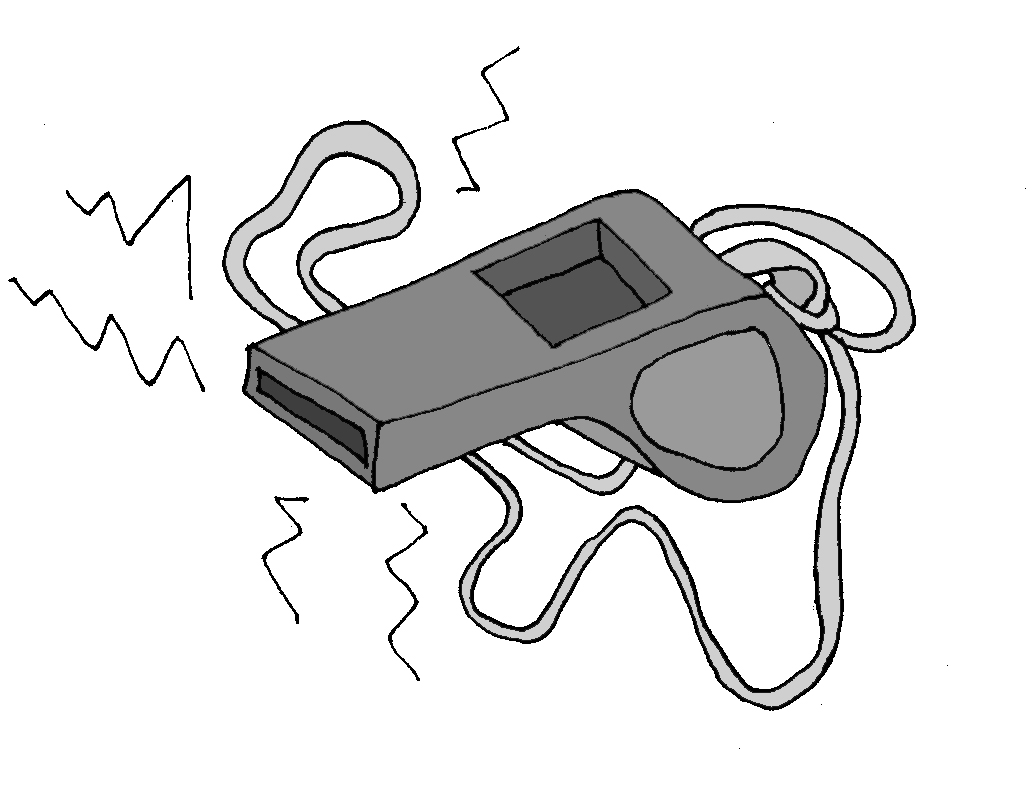Community Depends on Our Accountability
November 1, 2019
 This
piece represents the opinion of the author
.
This
piece represents the opinion of the author
.
 Sara Caplan
Sara CaplanI introduced the motion on the faculty floor requesting that President Clayton Rose provide an account of the process he used to invite Arthur Brooks as the inaugural Joseph McKeen Visiting Fellow. President Rose had not consulted any member of the faculty before doing so, and had thus committed a simple, procedural infraction. I believe that it is the job of any member of the faculty to blow their whistle in such circumstances. Basically, to use a soccer analogy, Rose has been caught “offsides.” Unlike in soccer, however, we can’t restart play from the position where the infraction was committed. Too much time had passed from when the transgression occurred to when it became known to the faculty. This public whistle-blowing is designed to ensure that proper procedure is followed in the future, and that all decisions of this nature are thereby made as transparently as possible.
Unfortunately, some members of our community have interpreted this procedural intervention as an implicit argument that Brooks ought not to have been invited at all. Nothing could be further from the truth. Had the faculty been properly involved from the beginning, most of us would have pushed for Brooks to enjoy significant time on our campus, and to be given real opportunities for actual engagement with as many members of our community as possible. When I first read President Rose’s glowing and lengthy announcement of the creation of this fellowship, and its inaugural appointee, I had assumed that Brooks would be staying here for at least a semester, if not the entire academic year. As it is, he will be devoting only about 36 hours to this fellowship each semester. My disappointment at this reminds me of a funny experience I had growing up.
I was born and raised in New Mexico. For all of my life my mom has worked physically grueling minimum-wage jobs. My father was absent—a homeless drifter who would pop up to take me bowling every few years, but then wander off to parts unknown. Only in the past few years has he moved from living rough on the streets of Las Vegas, to working at the emergency men’s shelter there in return for a bed and finally to have gotten into an apartment of his own. As a result, I spent almost every summer in either North Dakota or Texas in order to give my mom a break, and to keep me from getting in trouble on my own street. These summer sojourns were also opportunities for me to learn early how to work hard, in this case building grain bins, which is how my grandparents and uncles earned money when they weren’t busy in the fields. One summer my aunt promised to drive me and all my cousins, some of whom were also exiles from single-working-mom households in Oklahoma and Alabama, to a Mexican restaurant in a town near where we were camped out at our building site. So, we all pile in the back of the pickup and drive Lord knows how many miles, with our stomachs rumbling and our taste-buds aquiver. You can only imagine my particular disappointment as a native New Mexican, when, rather than pulling into some dusty cantina, we go through the drive-thru at Taco John’s. Talk about over-promising and under-delivering! I still give my Aunt Sandra grief about that. But, in her defense, she was doing God’s work in giving such a rag-tag crew of urchins a loving home for those months. Feeding us all must have just about broke her bank.
Which leads me back to Arthur Brooks, and the need to blow yet another whistle, this time accompanied by a sterner warning. Any person who suggests that those of us raising concerns about Brooks’ appointment are doing so because we are not willing to engage him intellectually, or are afraid of confronting his ideas, deserves a yellow card. They are “taking a dive” in the box, trying to convince everybody that we are doing something which we are not. It is a sham objection, designed to disingenuously frame our arguments and dismiss our concerns. This is not a procedural infraction, but unsporting misconduct, which is antithetical to the very spirit of the game. Having now read two books and a slew of editorials by Brooks, I am about as impressed by him as I was by Taco John’s. But I would never argue that others don’t have the right to eat that up whenever they want. Heck, I enjoy fast food with the best of them, but I won’t try to convince you of its nutritional content, nor will I try to argue that a 36-hour drive-thru allows for true gustatory contemplation.
So, why would I demand that Brooks stay around here for months on end if I am so underwhelmed? It is because I believe that, if he is to be a fellow in my community, then people like me deserve the right to talk to him at length. We have the right to publicly question him as we see fit regarding his Presidency at American Enterprise Institute (AEI). We have the right to publicly scrutinize his policy prescriptions, which have been so harmful to people who don’t enjoy his considerable privilege. Many of the experiences that shaped who I am today happened thanks to robust, well-funded public services. I learned violin and viola thanks to an exceptional music program in my school system. Albuquerque Public Schools gave me an instrument, and subsidized my private lessons with two of the finest teachers in the country. Three of my stand partners in our publicly-funded high school symphony are now professional musicians. I was given free tennis lessons on public courts thanks to the city parks and recreation department, and I played in a public soccer league competitive enough that my former teammates and opponents went on to play at programs like UCLA, and professionally in the MLS and Germany. I was a free-lunch kid at school, and I went to college on Pell Grants. Thanks to the economic ideas advanced by people like Brooks, every single one of these programs is now gone, a shell of its former self or so privatized as to make them open only to the wealthy. This destruction makes it all the harder for a child now growing up in my old neighborhood to discover their talents and achieve their flourishing. To be clear, I also benefited from private philanthropy. I was a “little brother” in the Big Brothers/Big Sisters program. I was a full-need student at a place much like Bowdoin, and I am fully aware that my college “scholarship” existed thanks only to the generosity of many alumni. I now donate to these programs myself every year. Arguing for the importance of the public does not mean denying the place of the private.
For many years, however, Brooks has pushed a Manichaean vision of the world. He has been a happy warrior fighting to dismantle publicly-funded common goods, even as he himself grew rich doing so. For a decade he pursued a highly partisan agenda, and wrote books like “The Battle,” in which he demonized his ideological opponents using hyperbolic, martial language. But now, having helped craft the hyper-polarized environment in which we live, he urges everybody to “love your enemies.” How convenient. He thinks that he can now preach Pauline love without accounting for his former Sauline deeds. To present him to our community as some sort of happiness guru who holds the keys to bipartisan bliss is akin to telling us that we need to take a meditation lesson from the arsonist who burned down our house. This would be possible, indeed fruitful, if we had some voice in shaping that encounter into an iterative, meaningful experience. This would take time, patience and sustained engagement. But we could then slowly come to trust that Arthur Brooks is not a protean opportunist at heart, and he could grapple honestly and openly with the basis for our contempt. This is why I made this motion—because properly-followed procedure would have encouraged stakeholder design, and given everybody a better chance for productive dialogue. This is why transparency and accountability are important. They exist not to annoy those in power, but to give voice to those who are not.
Robert Sobak is an associate professor of Classics.
Comments
Before submitting a comment, please review our comment policy. Some key points from the policy:
- No hate speech, profanity, disrespectful or threatening comments.
- No personal attacks on reporters.
- Comments must be under 200 words.
- You are strongly encouraged to use a real name or identifier ("Class of '92").
- Any comments made with an email address that does not belong to you will get removed.


Very well said, Rob!
Thank you for sharing this piece! Students deserve a chance to engage with Arthur Brooks and scrutinize his beliefs publicly. Limiting his time on campus and the number of students who may attend his events reveals that his fellowship may be more about pleasing conservative alumni than actually encouraging meaningful engagement.
Thanks Rob. I agree Brooks would ideally be here longer if he’s going to be a Fellow. But comparing his work to fast food and calling him an opportunist—ouch. I think you need to back claims like this with more specific evidence. From what I’ve read about The Battle, it does seem unduly simplistic/binary, perhaps downright inaccurate. That doesn’t mean it’s written in bad faith, and same for Love Your Enemies, which I think is quite good. As far as I know Brooks never disparaged the character of those he disagreed with (in The Battle or elsewhere). And the ‘competition of ideas’ chapter of Love helps explain why Brooks takes such strong positions (https://tinyurl.com/yyedrhqn).
Bottom line: as discussed in Love and related literature, affective polarization is driven by our bias to question the motives of those we disagree with. Awareness of this bias should make us think twice when we want to criticize the other side’s character. It’s not clear to me that you’ve grappled with Brooks’ arguments in Love, and related social science literature, vis-a-vis your own feelings toward Brooks. Maybe you don’t agree with these arguments, but if that’s the case, would be good to know why not!
Correction: he did at least imply that those who disagreed with him on policy were morally inferior (“Advocates of free enterprise .?.?. have to declare that it is a moral issue to confiscate more income from the minority simply because the government can.” https://newrepublic.com/article/69238/wealthcare). Apologies. It is certainly unclear how to reconcile this with what he’s written in Love Your Enemies. He should address this publicly, if he hasn’t yet.